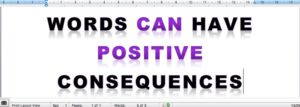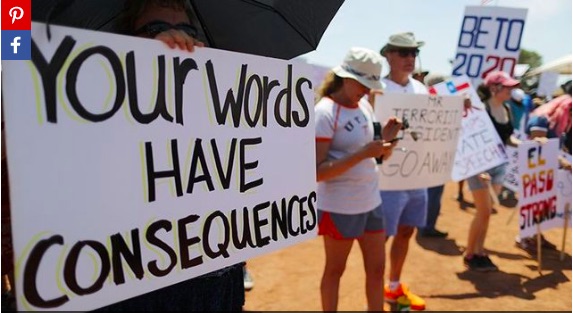
Words can be weapons or bringers of beauty.
We have recently seen ample evidence of the former, after two mass shootings took place in the US within 24 hours. The perpetrator of the El Paso shooting seemed to be inspired by Trump’s inflammatory rhetoric about immigrants “invading” America.

Put those three words into a Google News search and you may be astonished at how many results come up.
Here are just a few instances.
“Words have consequences and the President has made my community and my people the enemy,” said Texas Congresswoman Veronica Escobar after the attack in El Paso in which 22 people died. “He has told the country that we are people to be feared, people to be hated.”
“Words have consequences,” said Susan Bro, mother of Heather Heyer. “I grieve alongside the families in El Paso who lost their loved ones, as I lost my daughter two years ago in Charlottesville. We have to stop this inflammatory rhetoric from taking root in society.”
“Words have consequences,” said San Antonio resident and retired pastor Tom Heger. “When the President says evil things, they have consequences.”
“I am concerned by the President’s continued racist and dangerous rhetoric, which divides our communities and could lead to someone getting hurt,” said Democratic Representative and House Majority Leader Steny Hoyer. “Words have consequences.”
And here’s Theresa May, in her final speech as Prime Minister just a few weeks ago: “Words have consequences. And ill words that go unchallenged are the first step on a continuum to ill deeds. Towards a much darker place where hatred and prejudice drive not only what people say but also what they do.”
Even though most of us are not in a position of power like President Trump or former Prime Minister May, whose words carry more clout, how can we as individuals take responsibility for the words we put out into the world? How can we make sure our words have positive consequences?

Think of the words that have had a positive impact on you.
The parent or teacher who said, before an exam: “You’ve got this.”
The partner who told you, when you didn’t believe it yourself: “You’re beautiful.”
The friend who let you know: “You are my rock.”
Then there’s the thought leaders whose words you’ll never forget. Here are a few of the quotes that I have held close to my heart:
“People will forget what you said, people will forget what you did, but people will never forget how you made them feel.” – Maya Angelou
“The greatest thing you’ll ever learn is to love and be loved in return.” – Eden Ahbez
“Owning our story and loving ourselves in the process is the bravest thing we’ll ever do.” – Brene Brown
Then there are words I’ve shared that I know have had a positive impact on others.
“You’re not showing off, you’re showing up.”
“Share a story from your scars, not your wounds.”
“Feel it and breathe…”
And simply, but most powerfully:
“I love you unconditionally.”
How can we bring more of this language into the world? Words that support, encourage, show empathy, love and compassion – without losing any of our discernment or ability to think critically?
How can we defuse word bombs and neutralise the weaponisation of language?
Because it now seems crystal-clear…

Leave a Reply